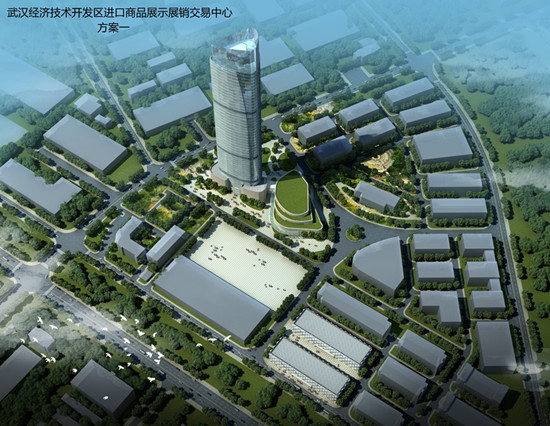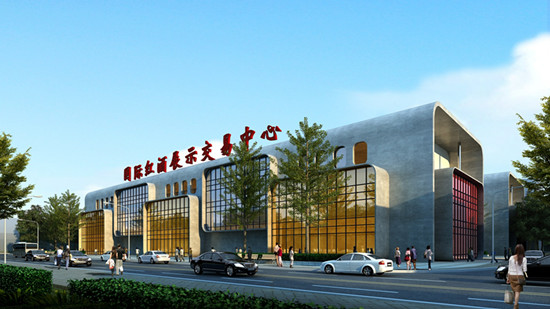
The zone has an area of 1.01 square kilometers. Located in the hinterland of the WHDZ, it faces Chechengnan Road, Zhushanhu Avenue, Dongjinghe Road and Dongfeng Avenue in four directions.
Infrastructure
The EPZ is equipped with well-developed infrastructure, including double-source water supply, double-circuit power supply, gas, steam, communications, roads, railways and drainage.
It also has 8,000-square-meter customs acceptance warehouses, 12,000-square-meter inspection sites and platforms, and 70,000-square-meter standard factory buildings.
Transportation
The zone is close to Wuhan's ring roads and ring expressways, four railways (Hankou-Danjiangkou, Beijing-Kowloon, Wuchang-Jiujiang, and Beijing-Guangzhou) and six expressways (Beijing-Hong Kong-Macau, Fuzhou-Yinchuan, Shanghai-Chengdu, Shanghai-Chongqing, Wuhan-Jianli and Shanghai-Wuhan).
The nearby Yangtze River provides linkage to rivers and lakes in central China constitutes a wide-coverage transport network.
Wuhan National Auto and Parts Export Base
The base was set up in the EPZ in 2006 as one of the first auto export bases approved by the Ministry of Commerce and the National Development and Reform Commission. It ranked third nationwide in 2011 in an expert assessment by the two ministries.
Industrial upgrade
The EPZ was assigned with more functions -- bonded warehousing, logistics, maintenance and research and development -- in January 2009 by the State Council.
It has attracted a cluster of processing trade and bonded logistics enterprises, mainly in autos, auto parts and electronics and appliances.
Its total imports and exports totaled USD 2.99 billion in 2015, ranking ninth among China's 53 export processing zones and topping those in central and western China.
It was chosen to pilot a flexible tax policy for domestic sales in 2016.
The EPZ mainly specializes in processing and manufacturing, trade logistics and producer services, including various modern services, such as electronic information, bonded logistics and research and development, testing, maintenance, Internet finance, display of high-end imports, and cross-border e-commerce.
It is applying to be a comprehensive bonded area to enjoy favorable taxation, foreign exchange and trade policies.
The comprehensive bonded area will focus on export processing and bonded logistics and expand other services.
Meanwhile, drawing on its special policy advantages, it will also handle trade in goods and services, such as financial leasing, and develop new functions of international procurement, maintenance, research and development, and commodity display.
With improved services, the bonded zone will become a new platform for open economic development and a bonded foreign trade services zone in the WHDZ.
According to the WHDZ's functions and development plans, the bonded area will focus on processing and manufacturing, trade logistics and producer services.
Development plan of major industries in the WHDZ's Comprehensive Bonded Zone
Processing and manufacturing
Automobiles
Auto parts
Electronics and appliances
Strategic emerging industries
Trade logistics
Foreign trade
Exhibition
Bonded logistics
Producer services
Testing and maintenance
Intermediary services
Comprehensive services
Preferential policies
Taxation
(1) Tenant enterprises are exempt from import duties and VAT for imported infrastructure materials and equipment.
(2) As imported goods are bonded in the area, domestic goods entering the zone enjoy export rebates.
(3) Tenant enterprises are exempt from VAT for fees of water, electricity and gas that are used for producing export goods.
(4) Goods in the zone for domestic sales are regarded as imported goods so they need customs declaration, and are taxed according to their actual conditions.
(5) Export goods and transactions between tenant enterprises are exempt from VAT and consumption tax.
Trade
The import-export quota and licensing policy does not apply to the area's foreign trade unless otherwise stipulated by laws, administrative rules or regulations.
Bonded warehousing services
(1) There is no storage time limit for bonded goods in the area.
(2) The policy of Security Deposit Ledger for Processing Trade and the restricted category for processing trade do not apply to tenant enterprises.
(3) Goods between enterprises in the area are allowed free flow.
Foreign exchange
(1) In accordance with the Measures for the Administration of Foreign Exchange in Bonded Areas that took effect on Oct 1, 2007, goods shipped or sold abroad do not need verification of export receipts of foreign exchange, and import goods paid in foreign currencies do not need verification of import receipts.
(2) Domestic goods entering or leaving the area can be settled in a foreign currency or renminbi.
Inspection and quarantine
(1) The bonded area is supervised and administered in accordance with regulations of China's General Administration of Quality Supervision, Inspection and Quarantine.
(2) Imported goods, office and life supplies of tenant enterprises are exempt from quality inspection.
(3) Domestic goods entering the area are exempt from inspection and quarantine.
(4) Inspection and clearance are separated for productive enterprises in the area.
Customs
(1) Imports and exports go through one customs declaration, one document examination, and one inspection. Recording, customs declaration and clearance, inspection and write-off procedures are handled by the area's customs.
(2) Domestic materials coming into the area should be declared to customs in batches.
(3) A fast track is used for picking up and clearing import and export goods to boost cooperation between the area and the port.
To facilitate people who want to invest and
set up company in Wuhan Export Processing Zone, here is an introduction of Types of business presence
in China:
Before starting up a business in China, you
have to know what are the options. Foreign Investors generally establish a
business presence in China in one of five modes: Wholly Foreign Owned
Enterprise (WFOE);
Representative Office; Foreign Invested Partnership Enterprises (FIPE);
Joint Venture and Hong
Kong Holding Company.
Wholly
Foreign Owned Enterprise (WFOE) is a Limited liability company wholly owned by
the foreign investor. WFOE requires registered capital and it's liability
of equity , can generate income, pay tax in China and it's profit could be
repatriate back to investor's home country. Any enterprise in China which is
100 percent owned by a foreign company or companies can be called as WFOE. No.
minimum registered capital is required for WFOEs with scope of business of
consulting, Trading, retailing, information technology etc. in China. There are
minimum registered capital still required for some industries for instance:
Banking, Forwarding etc Since China still maintains foreign currency control
policy, it's still advisable to choose registered capital within RMB 100,000 ~
RMB 500,000 as the minimum registered capital. Companies can now determine how
much capital will be required to maintain their operations and must simply
ensure that they meet those targets within a period of 10 years.
Representative
Office (RO) is a Liaison Office of it's parent company. It requires no
registered capital. It's activities would be: product or service promotion,
market research of it's parent company's business, Quality Control liaison
office etc in China. RO generally is prohibited to generate any revenue nor
generating contracts with local businesses in China.
Joint
Venture (JV) is a Limited liability company formed between Chinese investor and
Foreign investor. The parties agree to create a entity by both contributing
equity, and they then share in the revenues, expenses, and control of the
enterprise. JV usually been used by foreign investor to engage the so called
restricted in areas such like: Education, Mining, Hospital etc.
Since
March 1, 2010, Measures of Establishment of Foreign Invested Partnership
Enterprises (FIPE) in China is taking effect. The regulation, which take
effect since March 1, 2010, are known as the Administrative Measures for the
Establishment of Partnership Enterprise in China by Foreign Enterprises or
Individuals. There's no required minimum registered capital for a Foreign
Invested Partnership Enterprise (FIPE) in Shanghai, Beijing, Wuhan, Hangzhou
and rest cities of China
Hong
Kong Company usually been used as a Special Purpose vehicle (SPV) to invest
Mainland China. Hong Kong is one of the quickest locations to Incorporate a
business. Although a HK company is not a legal entity in Mainland China
(MainlandChina and Hong Kong, See Wiki 1 country, 2 systems), lots foreign
investors, especially investors from Europe and North America still chose to
setting up a Hong Kong company as SPV to invest China.
After China's entry to WTO, most industries
in China welcome foreign investment, WFOE
setting up in China becomes the first option of foreign investment's entity
structures instead of Rep. Office setting up in China At the mean time, for
tax purpose, effective licensing system etc more and more investors use Hong
Kong as the holding company to invest China mainland, using this offshore
company to hold their operations in China.
Business set-up in Wuhan is a big project
by itself, which requires financial and time commitments, business management
knowledge and China expertise. Identifying a competent agent to manage the
complex process will be a cost and time effective way to avoid potential
pitfalls
Since 2006, Tommy China
Business Consulting has been focusing on consulting services for our
clients to invest in Wuhan China. We are specialized in establishment of wholly
foreign owned enterprises (WFOEs), setting up of offshore companies, trading
services,
tax minimization, Assist in obtaining government approvals and certificates
for running business, negotiate and draft various legal documents provide
legal advice, negotiate government officer for Land acquisition. Advising
on formation of WOFE and business structures, managing and controlling WOFE in Wuhan
China, drafting privacy policies and structuring commercial transactions
TCBC will manage all aspects of
incorporation to get you a business license in Wuhan China. We offer a range of
company formation services including helping you to set up:
-Wholly Foreign Owned Enterprises (WFOE )
-Joint Ventures (Equity/Co-operative)
-Foreign Invested Partnership Enterprises
(FIPE)
Please visit:http://www.tommyconsulting.com/CorporateFormation.html
Email: tomlee@tommyconsulting.com, Skype:
tomleeli
WhatSapp/Wechat/Cell Phone: +86 18926401128

No comments:
Post a Comment